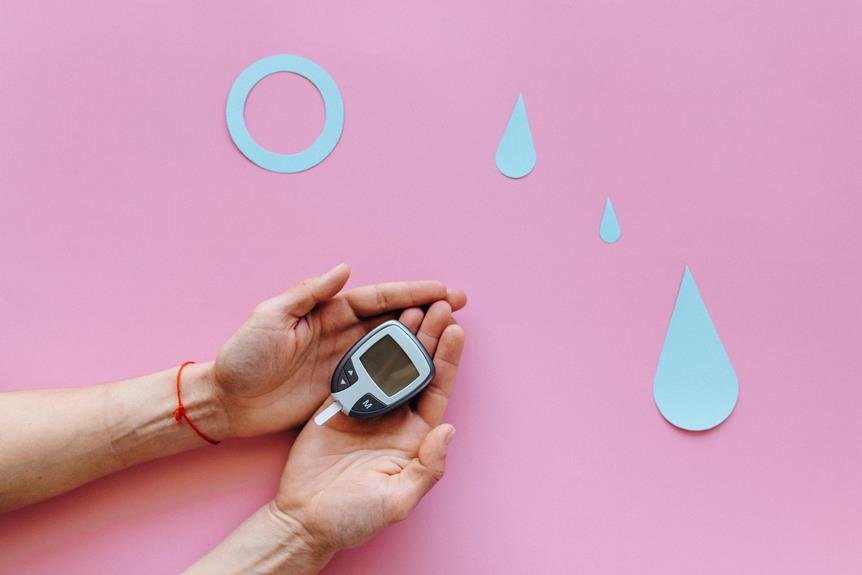The Link Between Blood Sugar Levels and Diabetes Neuropathy
Did you know that approximately 50% of individuals with diabetes will develop some form of neuropathy during their lifetime?
Understanding the intricate relationship between blood sugar levels and diabetes neuropathy is crucial for managing this condition effectively.
As you explore the impact of fluctuating glucose levels on nerve function, a deeper understanding of how neuropathy progresses can help you take proactive steps in managing your health.
Stay tuned to uncover the key strategies for managing blood sugar levels to prevent the onset or progression of diabetes neuropathy.
Understanding Diabetes Neuropathy
To understand diabetes neuropathy, you must grasp the connection between high blood sugar levels and nerve damage. When your blood sugar levels are consistently elevated, it can lead to damage to the tiny blood vessels that supply oxygen and nutrients to your nerves. These damaged blood vessels impair nerve function, causing tingling, numbness, or pain in the affected areas.
Moreover, high blood sugar levels can disrupt the delicate balance of chemicals responsible for transmitting signals along your nerves. This disruption can result in miscommunication between your nerves, leading to sensations of burning, sharp pain, or sensitivity to touch.
Over time, if blood sugar levels remain uncontrolled, the nerve damage can become permanent. This can severely impact your quality of life by causing difficulty in walking, balance issues, and even complications in everyday tasks due to decreased sensation in your extremities.
Therefore, managing your blood sugar levels through medication, diet, and lifestyle changes is crucial in preventing and slowing down the progression of diabetes neuropathy.
Impact of Blood Sugar Levels
When it comes to blood sugar levels, understanding how they affect neuropathy is crucial.
High sugar levels can increase the risk of developing diabetes neuropathy.
Managing your blood sugar effectively is key in preventing and managing the symptoms of this condition.
Sugar Levels and Neuropathy
Maintaining stable blood sugar levels plays a crucial role in managing and preventing neuropathy in individuals with diabetes. High blood sugar levels, common in uncontrolled diabetes, can damage nerves throughout the body, leading to diabetic neuropathy.
When blood sugar levels are elevated over time, the excess glucose can impair nerve function, causing tingling, numbness, or pain in the affected areas. By keeping your blood sugar within target ranges through proper diet, exercise, and medication, you can reduce the risk of developing neuropathy or slow its progression.
Monitoring your blood sugar levels regularly and working closely with your healthcare team are essential steps in preventing diabetes-related neuropathy complications.
Risk of High Levels
High blood sugar levels significantly increase the risk of developing diabetic neuropathy in individuals with diabetes. Consistently elevated blood sugar levels can damage the nerves throughout your body, leading to symptoms such as numbness, tingling, or pain, particularly in your extremities.
The excess sugar in your blood can injure the walls of the tiny blood vessels (capillaries) that nourish your nerves, affecting their ability to function properly. Over time, this damage can result in diabetic neuropathy, impacting your quality of life and daily activities.
Monitoring your blood sugar levels regularly and keeping them within the target range recommended by your healthcare provider is crucial in reducing the risk of developing diabetic neuropathy.
Managing Blood Sugar
To effectively manage your blood sugar levels and prevent diabetic neuropathy, it's essential to adopt healthy lifestyle habits and adhere to your healthcare provider's recommendations.
Monitoring your blood sugar regularly, following a balanced diet low in sugar and carbohydrates, and engaging in regular physical activity are key components of managing blood sugar levels.
Consistency is crucial; aim to eat meals at the same time each day and incorporate healthy snacks to maintain stable blood sugar levels.
Remember to take any prescribed medications as directed by your healthcare provider and attend regular check-ups to track your progress.
Nerve Function and Blood Sugar
Proper nerve function relies heavily on balanced blood sugar levels. When your blood sugar levels are consistently high, it can lead to damage of the nerves throughout your body. Nerves play a crucial role in transmitting signals between the brain and different parts of the body. When blood sugar levels aren't well-managed, this communication system can be disrupted, leading to symptoms such as tingling, numbness, or pain in the affected areas.
High blood sugar levels can also cause inflammation and oxidative stress, further contributing to nerve damage. This damage can result in a condition known as neuropathy, which is characterized by nerve dysfunction. Maintaining stable blood sugar levels through diet, exercise, and medication can help prevent or slow down the progression of neuropathy.
It's essential to monitor your blood sugar levels regularly and work closely with your healthcare provider to ensure that your levels are within a healthy range to support optimal nerve function.
Progression of Neuropathy
Maintaining stable blood sugar levels is crucial in preventing the progression of neuropathy, a condition characterized by nerve dysfunction. When blood sugar levels are consistently high, as seen in uncontrolled diabetes, it can lead to damage of the nerves throughout the body.
Initially, you may experience tingling or numbness in your extremities, such as your feet and hands. As neuropathy progresses, these symptoms can worsen, causing sharp pain, muscle weakness, and even difficulty coordinating movements. Left untreated, neuropathy can result in serious complications, including foot ulcers and infections that may require amputation.
It's essential to monitor your blood sugar levels regularly and work with your healthcare team to keep them within a healthy range. By managing your blood sugar effectively, you can slow down or even halt the progression of neuropathy, preserving your nerve function and overall quality of life. Remember, taking proactive steps now can make a significant difference in preventing neuropathy from advancing to more severe stages.
Managing Blood Sugar for Prevention
To prevent diabetes neuropathy, you need to be mindful of how sugar impacts your body, regularly monitor your glucose levels, and maintain dietary control. These actions are crucial in managing blood sugar levels effectively and reducing the risk of developing neuropathy.
Sugar Impact on Neuropathy
Keeping your blood sugar levels within a healthy range is crucial for managing and preventing neuropathy associated with diabetes. When blood sugar levels are consistently high, it can cause damage to the nerves throughout your body, leading to neuropathy symptoms such as numbness, tingling, and pain.
By controlling your blood sugar through a balanced diet, regular exercise, and medication as prescribed by your healthcare provider, you can help reduce the impact of neuropathy. Monitoring your carbohydrate intake, eating smaller meals more frequently, and avoiding sugary foods can all contribute to better blood sugar control.
Monitoring Glucose Levels
To effectively manage your blood sugar levels for preventing neuropathy, regularly monitoring your glucose levels is essential. By keeping track of your blood sugar levels throughout the day, you can identify patterns, understand how your body responds to food and medication, and make informed decisions to keep your levels within a healthy range.
Utilizing tools such as blood glucose meters or continuous glucose monitors can provide you with real-time data to adjust your diet, exercise, and medication as needed. Consistent monitoring allows you to proactively address any fluctuations in your blood sugar levels, reducing the risk of developing diabetes neuropathy.
Stay vigilant and take control of your health by staying on top of your glucose levels.
Dietary Control for Prevention
For effective prevention of diabetes neuropathy, maintaining control over your dietary choices to manage blood sugar levels is crucial. Focus on consuming a balanced diet rich in whole grains, lean proteins, fruits, and vegetables. Limit your intake of sugary foods, refined carbohydrates, and saturated fats.
Portion control plays a significant role in regulating blood sugar levels, so be mindful of serving sizes. Consider consulting a nutritionist or dietitian to create a personalized meal plan tailored to your needs.
Regularly monitoring your blood sugar levels and adjusting your diet accordingly can help prevent spikes that contribute to nerve damage. Remember, small changes in your dietary habits can have a big impact on your overall health and well-being.
Symptoms of Diabetes Neuropathy
Experiencing tingling sensations, numbness, or burning in your extremities could indicate the presence of diabetes neuropathy. These symptoms are often the first signs of nerve damage caused by consistently high blood sugar levels. As diabetes progresses, the tingling may turn into a loss of sensation, making it difficult to feel hot or cold temperatures or even touch. This can lead to injuries that go unnoticed, increasing the risk of infections and other complications.
Additionally, you may experience sharp pains or cramps, especially at night, disrupting your sleep and overall quality of life.
Muscle weakness and difficulty coordinating movements are also common symptoms of diabetes neuropathy. This can affect your balance and lead to a higher risk of falls. Digestive issues like bloating, constipation, or diarrhea may arise due to nerve damage in the gastrointestinal tract.
It's essential to pay attention to these symptoms and seek medical advice promptly to prevent further nerve damage and manage your condition effectively.
Importance of Monitoring Levels
Monitoring your blood sugar levels regularly is crucial in managing diabetes neuropathy and preventing further complications. By keeping a close eye on your blood sugar levels, you can better understand how your body is responding to different foods, activities, and medications. Consistent monitoring allows you to make timely adjustments to your treatment plan, ensuring that your blood sugar remains within the target range recommended by your healthcare provider.
Regular blood sugar checks also help you identify any fluctuations that may be putting you at risk for diabetic neuropathy. High blood sugar levels over an extended period can lead to nerve damage, so catching and correcting elevated levels early is essential in preventing the progression of this condition.
Furthermore, monitoring your blood sugar levels can provide valuable insights into how well your current management strategies are working. It empowers you to take proactive steps in controlling your diabetes and minimizing the impact of neuropathy on your quality of life. Remember, knowledge is power when it comes to managing diabetes neuropathy, and monitoring your blood sugar levels is a key tool in your arsenal.
Preventing Nerve Damage
To prevent nerve damage associated with diabetes neuropathy, it's essential to maintain stable blood sugar levels through consistent monitoring and adherence to a well-rounded treatment plan. Monitoring your blood sugar levels regularly allows you to make timely adjustments to your diet, medication, and lifestyle choices. This proactive approach can significantly reduce the risk of nerve damage caused by fluctuating glucose levels.
In addition to monitoring, managing your diet is crucial in preventing nerve damage. Focus on consuming a balanced diet rich in whole grains, lean proteins, healthy fats, and plenty of fruits and vegetables. Limiting sugar, refined carbohydrates, and unhealthy fats can help stabilize your blood sugar levels and protect your nerves from damage.
Regular exercise is another key component in preventing nerve damage. Physical activity not only helps control blood sugar levels but also improves circulation, which is essential for maintaining nerve health. Aim for a combination of aerobic exercises and strength training to keep your nerves healthy and functioning optimally. Remember, consistency is key in preventing diabetes neuropathy-related nerve damage.
Frequently Asked Questions
Can Diabetes Neuropathy Be Reversed or Cured Completely With Proper Blood Sugar Management?
With proper blood sugar management, diabetes neuropathy symptoms can improve. While complete reversal or cure may not always be possible, controlling your blood sugar levels can slow the progression and alleviate discomfort.
Are There Specific Foods or Supplements That Can Help Improve Nerve Function and Blood Sugar Levels in Individuals With Diabetes Neuropathy?
Imagine your plate filled with vibrant colors of vegetables like leafy greens, bell peppers, and berries. Incorporating these foods can support nerve function and help regulate blood sugar levels in diabetes neuropathy.
How Long Does It Typically Take for Nerve Damage to Occur in Individuals With Uncontrolled Blood Sugar Levels?
If blood sugar levels remain uncontrolled, nerve damage can develop over time. It typically takes several years for noticeable nerve damage to occur in individuals with consistently high blood sugar levels. Regular monitoring and management are crucial.
Are There Alternative Treatments or Therapies Available for Managing Diabetes Neuropathy in Addition to Medication and Blood Sugar Control?
You can explore alternative treatments like acupuncture, physical therapy, or supplements. These can complement medication and blood sugar management in managing diabetes neuropathy. Discuss with your healthcare provider to create a comprehensive care plan.
Can Diabetes Neuropathy Lead to Other Health Complications Besides Nerve Damage, and How Can These Be Prevented or Managed Effectively?
You can prevent further health issues by managing diabetes neuropathy effectively. Complications like foot ulcers and infections are common. Regular foot exams, proper footwear, blood sugar control, and a healthy lifestyle can help avoid these problems.
Conclusion
So, now you know the link between blood sugar levels and diabetes neuropathy. By managing your blood sugar levels effectively, you can prevent nerve damage and reduce the risk of developing neuropathy.
Some may argue that it's difficult to make lifestyle changes, but imagine a future where you no longer have to worry about the pain and discomfort of neuropathy.
Taking control of your blood sugar can lead to a healthier, happier life.




